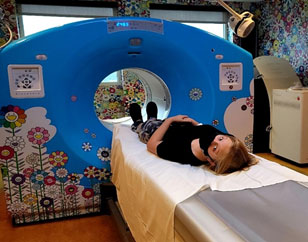By: Peter Rowe, MD, FAAP
Most kids and teens who test positive for COVID-19 have mild, or even no, symptoms. But it has become clear that some are experiencing symptoms more than a month after they've been infected with SARS-CoV-2, the virus that causes COVID-19.
A number of
post-COVID conditions have been identified in kids. Most notable are continued or recurring symptoms referred to as "long-haul COVID," or sometimes as "long COVID" or "Post-Acute COVID-19." Research on this condition continues.
Who gets long-haul COVID?
No one is certain exactly how many people who've had COVID-19 end up being long haulers. One study showed that as many as 52% of teens and young adults between ages 16 and 30 may experience lingering symptoms 6 months after having COVID. The U.K. Office for National Statistics estimated that 12.9% of children 2 to 11 years of age, and 14.5% of children 12 to 16 years old, still experienced symptoms 5 weeks after infection.
What experts do know is that long-haul COVID can happen even in people who had mild or no symptoms of COVID-19. The symptoms they had during the acute infection may not go away, even long after their infection is gone. Sometimes, long-haul COVID symptoms start after a person is feeling better. Or, if they were asymptomatic (didn't have COVID symptoms), they may experience them weeks later. Any of these symptoms can be new and different, or they may be the same as the ones your child had during the COVID infection.

COVID-19: We're in it for the Long Haul
By: Melissa Lynch
 COVID doesn't affect kids, right? That's what we thought at the beginning of this pandemic.
COVID doesn't affect kids, right? That's what we thought at the beginning of this pandemic.
We had just moved, and local schools were in virtual and hybrid learning mode. We needed the internet line run to our house still, so we went to a public place for WiFi access. There were only about 7 other students in the building. Physical distancing was in place, but masks were not required indoors for gatherings of less than 10 people at that time.
Within 3 days, we learned that one of the children in the building had tested positive for COVID. Within another 3 days, our 11-year-old daughter, Wednesday, started having mild symptoms of COVID. As a precaution, her doctor arranged for care in a virtual hospital for COVID-positive kids. Her symptoms remained mild: headaches, loss of smell, extreme fatigue. I was monitoring her vitals every two hours and reporting to the virtual hospital 3 times a day.
There were only 3 days that were a little risky. Wednesday's oxygen levels dropped into the 70s, so she was given albuterol treatments every 4 hours. Her breathing stabilized, and she was released from the hospital to resume normal activities and school. We didn't realize that our journey had only just begun.
Wednesday only got to return to school one day before the lethargy returned. She saw her primary care doctor and was diagnosed with Post-Acute Covid-19. The lethargy, along with headaches, extreme fatigue and intermittent low-grade fevers, lasted through December.
In January, her cardiologist cleared her to return to normal physical activity. She tried to ease back into cheerleading, but after 3 weeks came home from practice feeling lethargic. She spiked a 103.4 fever and could not get out of bed for 3 days.
Wednesday was unable to keep up even with the virtual classes, falling asleep wherever she sat. We pulled her from a structured school environment to give her the flexibility needed for medical reasons, and homeschooled her. During homeschool, we realized that she was not retaining what she was learning; she could watch a documentary and not remember anything about it.
She had been an Honor Roll student at an award-winning magnet school who tested above her grade level in several subjects. Now, she couldn't even take notes. Her cognitive levels in learning were soon showing her at a 31 percentile and 2 grade levels behind.
Wednesday, now 12, has met testing protocols for multisystem inflammatory syndrome in children (MIS-C) 3 times. She's been diagnosed with Post-Exertional Malaise and Postural Orthostatic Tachycardia Syndrome (POTS). Since January, she has had 23 relapses of post-COVID symptoms. They average about 2 weeks apart. Every relapse seems different with new symptoms each time.
She is declining. At this writing, she has swollen lymph nodes and a 103.2 fever. She is dealing with cardiac symptoms such as rapid heartbeat, chest pressure, fainting and major fluctuations in her blood pressure. She has gastrointestinal symptoms like vomiting and abdominal pain, and neurological issues like loss of feeling in her lower extremities. She recently experienced a seizure.
My once happy and energetic child's eyes now cloud over. She glitches like a computer rebooting during normal everyday tasks.
As we've learned all too well, COVID-19 does affect children. Even kids who had no symptoms, or only mild symptoms while infected, can develop the debilitating symptoms of Long COVID. I wouldn't wish this on anyone.
Melissa Lynch, CMA, RMA, is the USA Lead Director for the international parent organization Long Covid Kids.
What are symptoms of long-haul COVID?
The most common symptoms of long-haul COVID include:
Fatigue and poor physical endurance
Difficulty thinking or concentrating, also known as "brain fog"
Cough
Trouble breathing
Joint or muscle pain
Chest or stomach pain
Mood changes
Headache
Fever
Heart palpitations
Loss of or changes in smell or taste
Lightheadedness when standing up
There are a variety of chronic symptoms your child can experience after having COVID-19. The specific symptoms your child has could depend on how severe their COVID infection was. For instance, if your child was in the intensive care unit (ICU) on a ventilator, they might have fatigue and weak muscles, as well as a fast heart rate and brain fog. These are common effects in people who have spent time in the ICU.
How is long-haul COVID diagnosed?
There's no specific test to diagnose long-haul COVID, so it's diagnosed based on symptoms. Your pediatrician may run other tests or refer you to a pediatric sub-specialist, especially if symptoms continue more than 3 months. They will want to be certain there's nothing else causing your child's symptoms.
How long does it last?
That's still unknown. More studies are needed to understand what's going on.
What causes it?
Researchers are still trying to figure out what causes some people to experience long-haul COVID. It will probably take some years before we know much.
How is it treated?
Treatment depends on what symptoms your child is having. Your pediatrician will treat individual symptoms, such as headaches, lightheadedness, or problems sleeping.
What about multisystem inflammatory syndrome in children (MIS-C)?
You may have heard of
multisystem inflammatory syndrome in children (MIS-C), a serious condition that may be related to COVID-19. However, doctors don't know for sure yet what causes MIS-C. They just know that many kids who have had it either had COVID-19 or were around someone else who did. Keep in mind that MIS-C is rare.
When to seek help
If your child has been infected with SARS-CoV-2, stay in touch with your pediatrician to monitor for any lingering symptoms. Many medical centers in the United States are creating post-COVID care clinics so they can treat long-haul COVID more effectively. Your pediatrician can help you find a subspecialist or clinic if your child needs one.
Remember
COVID-19 vaccines are the best way to protect your family against COVID-19 and post-COVID conditions, including long-haul COVID. Vaccines are currently available for anyone 5 years of age and older. Clinical trials are underway for children as young as 6 months old.
More information
About Dr. Rowe
 Peter Rowe, MD, FAAP, is a Professor of Pediatrics at the Johns Hopkins University School of Medicine and serves as the Director of the Chronic Fatigue Clinic at Johns Hopkins Children's Center. He is a member of the American Academy of Pediatrics Maryland Chapter. Peter Rowe, MD, FAAP, is a Professor of Pediatrics at the Johns Hopkins University School of Medicine and serves as the Director of the Chronic Fatigue Clinic at Johns Hopkins Children's Center. He is a member of the American Academy of Pediatrics Maryland Chapter.
|